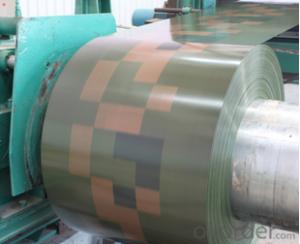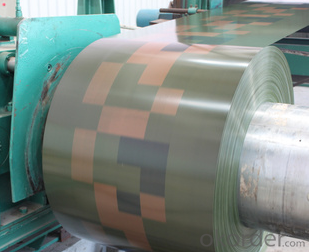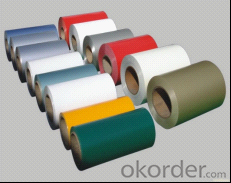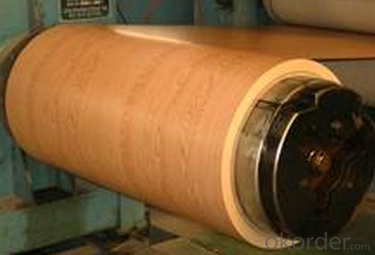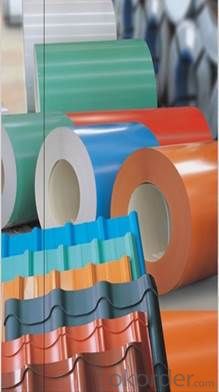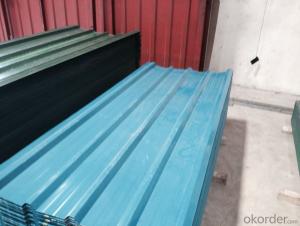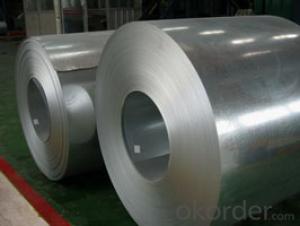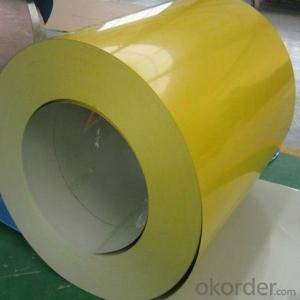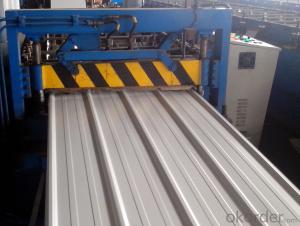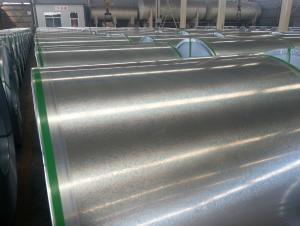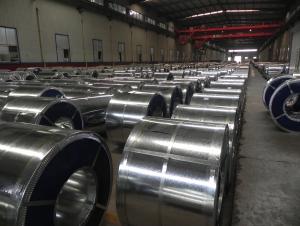Color coated galvanized steel coils SGCC, DX51D,China origin
- Loading Port:
- China main port
- Payment Terms:
- TT OR LC
- Min Order Qty:
- 1 m.t.
- Supply Capability:
- 1000000 m.t./month
OKorder Service Pledge
OKorder Financial Service
You Might Also Like
1) AVAILABLE DESIGNATION OF (Prepainted galvanized steel coils) printed PPGI coils
Quality Q/BQB 440-2003 JIS G3312-1994 EN 10326-2004 ASTM A653-02a
EN 10327-2004 (BASE PLATE)
(BASE PLATE)
Commercial Steel TDC51D CGCC DX51D+Z/AZ CS Type A/B/C
Forming Steel (TSt01,TSt02,TSt03) CGCD1 FS Type A, Type B
Drawing TDC52D /TDC53D - DX52D+Z/AZ DDS TYPE A/C
Steel DX53D+Z/AZ
Structural TS280GD(TStE28) CGC400 S280D+Z/AZ SS275
Steel TS350GD(TStE34) CGC440 S350D+Z/AZ SS340 Class1
2) OUR SPECIFICATION OF (Prepainted galvanized steel coils) printed PPGI coils
Available Size:
Manufacturer Thickness Width Length of plate Inner diameter of coil
JIANGSU HUIYE STEEL SHEET CO.,LTD 0.2-1.2mm 800/914/1000/1200/1219/1250mm 1000-6000mm 508mm/610mm
Coated Mass OF (Prepainted galvanized steel coils) printed PPGI coils:
Base plate Available Coated Mass(g/m^2)
Galvanized Steel 80, 100, 120, 160, 180
Galvalume Steel 50, 70, 150
Available Painting OF (Prepainted galvanized steel coils) printed PPGI coils:
Category of Painting Item Code
Polyester PE
High-durability polyester HDP
Silicon modified polyesters SMP
Polyvinylidene fluoride PVDF
Easy-Cleaning —
Painting Thickness Top side: 20+5microns;
Bottom side: 5~7microns.
Color System Produce according to RAL Color System or as per buyer’s color sample.
Painting structure Top surface Bottom surface
Primer coating No coating 1/0
Primer coating Primer coating 1/1
Primer coating + Finish coating No coating 2/0
Primer coating + Finish coating Primer coating or single back coating 2/1
Primer coating + Finish coating Primer coating + Finish back coating 2/2
- Q: Hi, I live in the Boston area and I'm trying to find a steel suppler that can provide mild steel for hobby welding. I can go through my job, but we only put in orders every couple of months so it's not very convenient. Also, the few suppliers I've found only sell in bulk. So if anyone knows where I can angle irons, flat bars, sheets, etc... by the piece it would greatly appreciated. Thanks
- They will sell any quantity of metal and even cut it to size - my experience has been that their prices are not wildly out of line for single pieces of full length stock compared to buying singles where you have to buy a minimum. They also may have sizes that ordinary places consider odd. I was looking for 5/8 square 16 gauge and was told it would have to be shipped in from Houston (to Dallas) by my nearest supplier and found it in stock at MetalSM. But check if you get something odd - the 5/8 cost more than 3/4 at both places and MetalSM actually gave me 3/4 but took it back even though I had cut it. Also check the regular steel suppliers in your area as well as retail welders metal supply places.
- Q: How are steel coils used in the manufacturing of metalworking tools?
- The manufacturing of metalworking tools heavily relies on steel coils, which are an essential component in the process. These coils, typically made from high-quality steel, serve various purposes at different stages of production to produce a variety of metalworking tools. Blades and cutting tools, for instance, are one primary application of steel coils in metalworking tool manufacturing. These coils are usually cut into specific lengths and then shaped and sharpened to create blades used for cutting, shaping, and milling different metals. The use of high-quality steel in these coils guarantees durable, strong blades capable of withstanding the demanding conditions of metalworking processes. Another use of steel coils in metalworking tool manufacturing is for the production of drill bits and other types of tooling. The coils are shaped and machined to achieve the desired size and shape of the tool, followed by a hardening and tempering process to enhance their strength and durability. This ensures that the resulting tools can endure the high-speed drilling and cutting operations involved in metalworking. Additionally, steel coils are utilized to construct the bodies and handles of metalworking tools. The coils are typically formed into the desired shape and size using various techniques like bending, rolling, and stamping. These formed pieces are then welded or fastened together to create the final structure of the tool. The high-quality steel used in the coils ensures that the resulting tool bodies and handles possess strength, rigidity, and the ability to withstand the forces and vibrations associated with metalworking operations. In summary, steel coils are crucial in the manufacturing of metalworking tools as they are used to create blades, drill bits, bodies, and handles. These coils provide the necessary strength, durability, and precision required in metalworking processes. Considered an essential raw material, steel coils enable the production of high-quality, reliable, and efficient metalworking tools.
- Q: What are the different types of steel coil finishing machines?
- There exists a variety of steel coil finishing machines, each designed to accomplish specific tasks and attain desired outcomes. Some commonly encountered types are as follows: 1. Slitting Machines: These machines are employed to divide large steel coils into narrower strips of desired widths. They comprise a set of circular blades that cut through the coil as it progresses through the machine, resulting in multiple smaller coils or strips. 2. Cut-to-Length Machines: These machines are utilized to cut steel coils into specific lengths. They can be programmed to execute precise cuts at predetermined lengths, thereby ensuring accuracy and consistency. 3. Recoiling Machines: Recoiling machines are deployed to rewind steel coils into tightly wound, compact rolls. They are typically used to create smaller coils from larger ones or to recondition coils that have become loose or damaged. 4. Edging Machines: Edging machines serve the purpose of removing excess material from the edges of steel coils, thereby enhancing their overall appearance and ensuring uniform width throughout the coil. 5. Coating Machines: These machines are utilized to apply diverse coatings or finishes to the surface of steel coils, such as paint, galvanized coatings, or protective films. They often incorporate drying or curing systems to guarantee proper adhesion and durability of the applied coatings. 6. Packaging Machines: Packaging machines are employed to wrap or package steel coils for transportation or storage. They can envelop the coils in protective materials, such as plastic or paper, and secure them using strapping or other fastening methods. 7. Inspection Machines: These machines are used to scrutinize the quality and integrity of steel coils. They have the capability to detect defects, such as cracks, scratches, or surface irregularities, and provide feedback for the purpose of quality control. These examples merely scratch the surface of the diverse array of steel coil finishing machines available. Each machine serves a specific role in the steel coil finishing process, guaranteeing that the final product meets the desired specifications and quality standards.
- Q: How do steel coils contribute to the automotive manufacturing sector?
- Steel coils are essential in the automotive manufacturing sector as they are used to produce various components such as body parts, frames, and suspension systems. The high strength and durability of steel coils make them ideal for ensuring the safety and structural integrity of vehicles. Additionally, steel coils are easily moldable, allowing manufacturers to create complex shapes and designs, contributing to the overall aesthetics and functionality of automobiles.
- Q: How are steel coils inspected for surface finish variations?
- Steel coils are inspected for surface finish variations by using techniques such as visual inspection, magnetic particle inspection, and surface roughness measurement.
- Q: How are steel coils used in the production of prefabricated buildings?
- Steel coils are used in the production of prefabricated buildings as they are flattened and cut into specific sizes to serve as the structural framework. These coils are typically formed into beams, columns, and other essential components, which are then assembled and interconnected to create the building's frame. The strength and durability of steel make it an ideal material for prefabricated structures, ensuring the safety and stability of the buildings.
- Q: Can steel coils be coated with PVC?
- Yes, steel coils can be coated with PVC. PVC coating provides added protection against corrosion and increases durability and longevity of the steel coils.
- Q: What are the safety standards for steel coil manufacturing?
- The safety standards for steel coil manufacturing are designed to ensure the well-being and protection of workers, as well as the quality and reliability of the products produced. These standards encompass various aspects of the manufacturing process and cover both general safety guidelines and industry-specific requirements. One of the main safety standards for steel coil manufacturing is the implementation of proper machinery and equipment safeguards. This includes ensuring that all machinery and equipment used in the manufacturing process are properly maintained, regularly inspected, and equipped with safety features such as emergency stop buttons and safety guards. Workers should also receive adequate training on the safe operation of these machines and be aware of potential hazards. Another important safety standard is the use of personal protective equipment (PPE). Workers involved in steel coil manufacturing should be provided with appropriate PPE, such as safety goggles, gloves, ear protection, and protective clothing, to protect them from potential hazards such as flying sparks, noise, and chemical exposure. Additionally, safety standards for steel coil manufacturing emphasize proper handling and storage of materials. This includes guidelines on how to safely lift and transport heavy steel coils, as well as rules for stacking and storing them to prevent accidents and injuries. Fire safety is also a crucial aspect of the safety standards for steel coil manufacturing. Measures should be in place to prevent and control fires, including regular inspections of electrical systems, proper storage and handling of flammable materials, and the presence of fire extinguishers and emergency evacuation plans. Furthermore, safety standards require regular safety training and awareness programs for all employees involved in steel coil manufacturing. This ensures that workers are well-informed about potential hazards, safety procedures, and emergency protocols. Regular safety audits and inspections are also conducted to assess compliance with these standards and identify areas for improvement. Overall, the safety standards for steel coil manufacturing aim to create a safe working environment, reduce the risk of accidents and injuries, and ensure the production of high-quality steel coils. Compliance with these standards is essential for maintaining the well-being of workers, protecting the environment, and maintaining the reputation of the manufacturing industry.
- Q: Can we construct a barn using steel and will it be a durable one?
- Steel barns in the USA is the going fad; they are both strong and economical; and some companies offer DIY kits
- Q: What are the common coil processing equipment used in the industry?
- Some common coil processing equipment used in the industry include coil slitting machines, coil winding machines, coil straighteners, coil feeders, and coil cradles. These machines are used to cut, shape, and feed metal coils in various manufacturing processes.
Send your message to us
Color coated galvanized steel coils SGCC, DX51D,China origin
- Loading Port:
- China main port
- Payment Terms:
- TT OR LC
- Min Order Qty:
- 1 m.t.
- Supply Capability:
- 1000000 m.t./month
OKorder Service Pledge
OKorder Financial Service
Similar products
Hot products
Hot Searches
Related keywords
